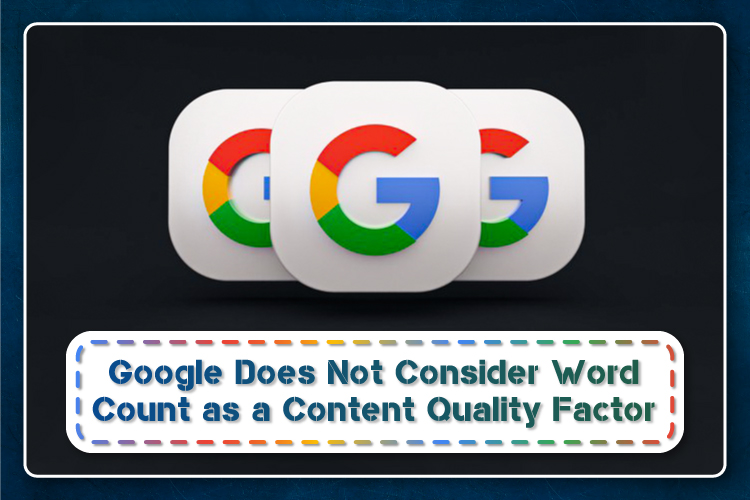Google Does Not Consider Word Count as a Content Quality Factor

In the latest Google SEO office-hours hangout, Google’s John Mueller said that the total word count in a piece of content isn’t a factor that the search engine takes into account to determine its quality.
A person asked Mueller if it would be useful to include more words on a web page to rank it higher in the SERPs. In essence, the main idea behind this question was that if a page is not ranking well in the search results, adding more relevant content to it might help.
Let’s see what Mueller had to say about this.
Will Adding More Relevant Content Help Increase Rankings?
The person who asked Mueller this question wanted to find out if adding more relevant content would be useful in increasing a web page’s ranking.
Here, the person was uncertain about what they meant by “relevant content” precisely as it can imply various things.
It all comes down to if the content is relevant to the searcher’s intent or the readers or the keywords.
There are plenty of ways in which content can be relevant, with a few of those ways being more beneficial for ranking compared to others.
Putting their question forward, the individual said that assuming they want to enhance a page’s content and for that, they add as much relevant content as possible for the readers to it. Does adding that relevant text means Google will automatically presume that the web page is better? The person wanted to know if that’s how things work out or if more content is better in Google’s eyes.
Updating Content Isn’t a Simple Process
In response to the question put forward, Google’s John Mueller said that updating a piece of content is not as simple as adding more text.
Is Word Count of Article Linked to Its Quality
The idea that good-quality posts are comprehensive is pretty common in the SEO world. Since often quality content is comprehensive, it is believed that those posts are naturally lengthier.
Because how can a piece of content be comprehensive but not long, isn’t it?
One can see this misperception everywhere. A content’s quality is often linked to comprehensiveness, meaning a higher word count.
Continuing his answer, Mueller further said that from their viewpoint, the total number of words on a particular web page isn’t considered a quality factor or even a ranking factor for that matter.
Therefore, blindly putting in additional text to a web page won’t help its ranking.
Explaining his answer, Google’s John Mueller gave an example of a book vs. a brochure. He said that this is a bit like you want to present something to a client who is walking in. Now you can give them a brochure with one or two pages, or you can hand over a large book.
While in a few cases, people would like to have a book full of information, other times, people prefer something short and straightforward. The same goes for search.
So if you have all the details that you need to index your page while making sure the audience and Googlebot can understand what the page is all about in a short version, you don’t have to make it longer. Adding more content to a page isn’t going to make it any better.
What About Thin Content?
While a few people might say that thin content is the type of content that Google won’t rank in the search results simply because it is too short, that’s not true.
Generally, thin content is viewed as content that has a lower word count. However, a more accurate definition of thin content will be a piece of content that is short of usefulness.
To put it in another way, factors defining thin content go way beyond just the total word count on a web page.
Refining Articles to Improve Rankings
Refining a piece of content in the hope of increasing its rankings can be quite tricky. First things first, you need to evaluate what the specific page is all about and whether it meets the goal of passing on all the necessary information a site visitor might come looking for on your website.
In some cases, a post fails to perform as expected because it does not provide the information the users wanted to find when they performed the search query. Also, what users intend to see when they search for something on the web can shift.
You can, in some cases, discover the reasons an article stops ranking on the SERPs by spotting if the traffic slowed down eventually or if there was a specific time when it faded away. These are just a few data points you should consider before you formulate a strategy to improve the rankings of a piece of content.
Wrapping It Up
Over the years, Google has made it clear that it prioritizes the user experience above everything else. It aims to present the searchers with the most relevant results that answer their queries in the best way possible. So, it doesn’t ‘really’ matter if your article is short; if it answers the search query accurately and provides sufficient information that fulfills the searcher’s intent, you can let it be. As John Mueller said, blindly adding more content to your page won’t help it in any way. As for improving your content to increase its rankings, you must find out why it stopped ranking in the first place. Keep those points in mind, and then rewrite your article to see some results, hopefully.
